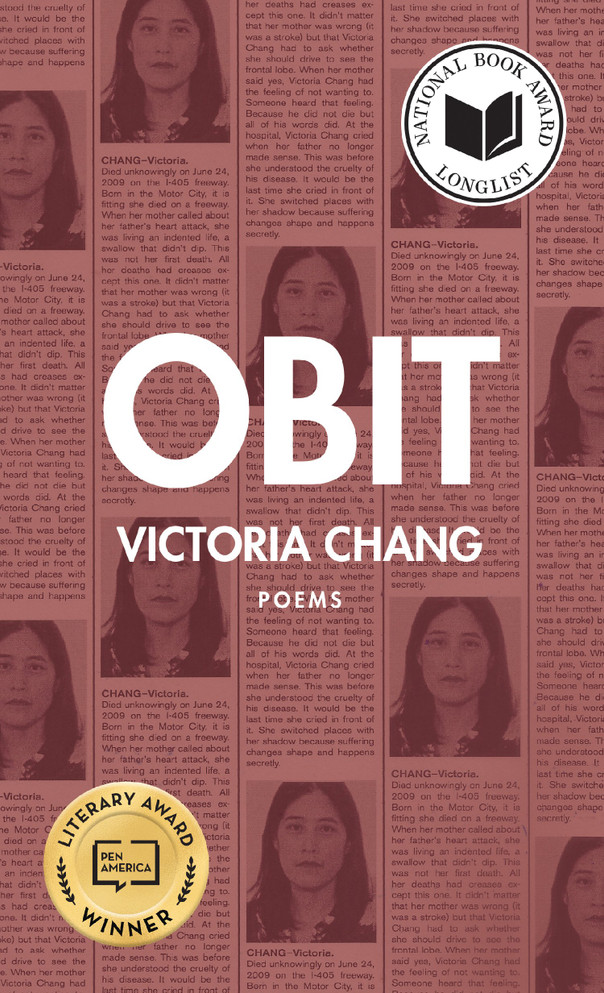Obit

Obit
Description
's 100 Must-Read Books of 2020
NPR's Best Books of 2020
National Book Award in Poetry, Longlist
Frank Sanchez Book Award
Chang writes of "the way memory gets up after someone has died and starts walking." These poems reinvent the form of newspaper obituary to both name what has died ("civility," "language," "the future," "Mother's blue dress") and the cultural impact of death on the living. Whereas elegy attempts to immortalize the dead, an obituary expresses loss, and the love for the dead becomes a conduit for self-expression. In this unflinching and lyrical book, Chang meets her grief and creates a powerful testament for the living.
"When you lose someone you love, the world doesn't stop to let you mourn. Nor does it allow you to linger as you learn to live with a gaping hole in your heart. Indeed, this daily indifference to being left behind epitomizes the unique pain of grieving. Victoria Chang captures this visceral, heart-stopping ache in Obit, Time Magazine
Customers Also Viewed
BookLoop is your trusted local Australian destination for books, games, toys, puzzles, tarot cards, stationery, and thoughtful gifts, offering a huge range of carefully curated products for curious minds of all ages. As a proudly Australian-owned bookstore, we are passionate about connecting our community with inspiring reads, creative play, and unique finds that bring joy, spark imagination, and support lifelong learning. Whether you're shopping for bestselling fiction, children’s picture books, educational resources, or non-fiction titles that encourage mental health, mindfulness, and personal growth, our ever-expanding book collection has something for everyone—including titles from local Australian authors that celebrate homegrown talent and storytelling. But we’re more than just a bookstore—our diverse range includes engaging puzzles for solo or family fun, educational and screen-free toys designed to develop skills and creativity, and family-friendly board games that bring people together. If you're looking for something with a little extra meaning, our beautifully illustrated tarot cards and oracle decks are perfect for beginners and seasoned readers alike, with options chosen for their artistry, symbolism, and accessibility. We also carry a range of gifts and stationery, from handcrafted journals and high-quality pens to bookmarks, greeting cards, candles, and calming tools, making it easy to find the perfect present for birthdays, celebrations, or simply because. Every product on our shelves is selected with care, quality, and purpose, making BookLoop a one-stop shop for thoughtful, meaningful shopping that supports creativity and wellbeing. We believe in the value of small business and community connection, which is why we’re committed to sourcing products that reflect our values and offering the kind of friendly, personalised service that big retailers can’t match. When you shop with us, you’re not only choosing beautifully curated items—you’re supporting a local Australian business that genuinely cares. We ship Australia-wide with a flat rate to keep things simple and affordable, and every order is carefully packed and quickly dispatched by our small, dedicated team. Our online shopping experience is safe, easy, and user-friendly, making it convenient to explore our wide range of books, gifts, and games from the comfort of home. We’ve seen a growing demand for titles and toys that support mental health, especially in children and teens, and we’re proud to stock a growing number of books on ADHD, emotional regulation, positive thinking, and self-esteem, as well as calming puzzles and sensory-friendly gifts that are both fun and supportive. Whether you're looking to inspire a young reader, encourage imaginative play, find your next favourite novel, or gift someone something truly special, BookLoop has you covered. Thank you for choosing to shop local and support a business that believes in the power of stories, creativity, and connection—explore our full collection today and experience the difference of thoughtful, heart-led retail with BookLoop.


